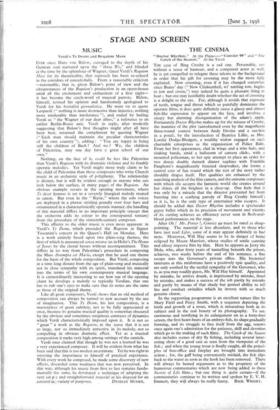THE CINEMA
" Doctor Rhythm." At the Plaza—" Convict 99" and " The Catch of the Season." At the Tivoli
THE case of Bing Crosby is a sad one. Personable, not without a sense of humour, and a competent actor as well, he is yet compelled to relegate these talents to the background in order that his gift for crooning may be the more fully exploited. Now crooning, even if it has changed somewhat since Burns' day (" Now Clinkumbell, wi' rattling tow, begins to jow and croon,") may indeed be quite a pleasant thing to hear ; but one may justifiably doubt whether the act of crooning is a delight to the eye. For, although it avoids that exposure of teeth, tongue and throat which so painfully dominates the operatic films, it does quite definitely cause a glassy and almost fish-like expression to appear on the face, and involves a sleepy but alarming disorganisation of the adam's apple. Fortunately Doctor Rhythm makes up for the misuse of Crosby, the inanities of the plot (unredeemed even by the magnificent three-round contest between Andy. Devine and a sea-lion in a pond), by the introduction of Beatrice Lillie, as Mrs. Lorelei Dodge-Blodgett, a wealthy widow engaged on such charitable enterprises as the organisation of Police Balls. From her first appearance, clad in wings and a wire halo, and shaking hands, amid a hailstorm of camera clicks, with a mounted policeman, to her epic attempt to place an order for two dozen double damask dinner napkins with Franklin Pangborn's magnificently frenzied shopwalker, she forms a central core of fun round which the rest of the story rather shoddily drapes itself. Her qualities are enhanced by the searching analysis of the film camera, and the extreme composure with which she accepts the fantastic world she creates around her shines all the brighter in a close-up. One feels that it was only by a miracle that the director prevented her from bursting into a scathing parody of Bing Crosby himself ; as it is, he is the only type of entertainer who escapes. It should be added that Doctor Rhythm includes a spectacular gypsy ballet which in its precision of movement and niceties of its cutting achieves an efficiency never seen in flesh-and- blood performances on the stage.
After Oh ! Mr. Porter !, Convict 99 must be rated as disap- pointing. The material is less abundant, and to those who have just read Lifer, some of it may appear definitely in bad taste. Moreover, Will Hay seems to be in danger cf being eclipsed by Moore Marriott, whose studies of senile cunning and idiocy improve film by film. Here he appears as Jerry the Mole, who, after forty years of tunnelling beneath the prison, achieves, two weeks before the end of his sentence, a fine escape into the Governor's private office. His hysterical tantrums at this misfortune have a positively epic quality, and are only soothed by the tactful sympathy of the Governor, who is, as you may readily guess, Mr. Will Hay himself: Appointed by mistake, he arrives drunk, is imprisoned by mistake, freed by mistake, and makes a success of the job partly by mistake and partly by means of that shady but genteel ability to tell lies and conduct swindles which he invests with so much genuine charm.
In the supporting programme is an excellent nature film by Mary Field and Percy Smith, with a sequence depicting the birth and growth of a trout, which is miraculous both in its subject and in the real beauty of its photography. To see, enormous and terrifying in its enlargement on to a forty-foot screen, the first heart-beats of an embryo fish, its shape gradually forming, and its struggle to free itself from the egg, renews once again one's admiration for the patience, skill and devotion which go to the making of such films. The Catch of the Season also includes scenes of dry fly fishing, including several inter- esting shots of a good cast as seen from the viewpoint of the fish ; and when the young trout is fi ally caught, all the princi- ples of box-office and fairplay are brought into immediate action ; for, the gaff being conveniently mislaid, the fish slips back to the water as soon as the hook has been removed. There will always be heated arguments as to the propriety of the humorous commentaries which are now being added to these Secrets of Life films ; but one thing is quite certain—if the commentaries continue to be written and spoken by E. V. H. Emmett, they will always be really funny. BASH. WRIGHT.


















































 Previous page
Previous page